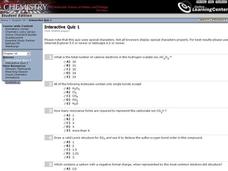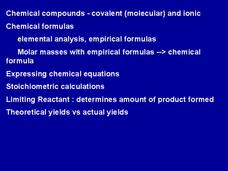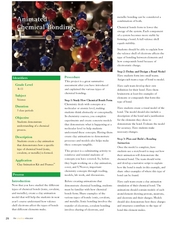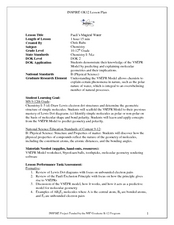Curated OER
Chemistry and Bonding
In this bonding worksheet, students take an interactive quiz with 15 multiple choice questions about the VSEPR Theory, bonding, the geometry of molecules, Lewis structures, resonance structures and enthalpy changes.
Curated OER
Chemical Compounds
Your young chemists will find these slides very informative. Groups and periods of the periodic table are labeled and described according to the charge. Comprehensive explanations of physical and chemical properties and how they relate...
Curated OER
The Interactive Periodic Table of the Elements
Students study the different types of metals. In this investigative lesson students watch a demonstration on the effects of temperature on atoms and take a tour through baone matter.
Curated OER
Activity #3 Are Particles "Real?"
Students verbalize a simple particle theory, They apply their particle theory to explain what happens during chemical reactions and how this theory supports the law of conservation of matter. Pupils comprehend that the atomic theory,...
Curated OER
Naming and Writing Chemical Formulae-I
In this naming and writing chemical formulas worksheet, students are given directions and practice writing simple chemical formulas. They identify positive and negative valence elements, they name nonmetal compounds, they name compounds...
Curated OER
Radioactivity Experiments
Students study the difference between types of ionizing radiation and how elements are transmuted. They determine that radiation is normal and surrounds us. They calculate the amounts of alpha, beta and gamma radiation emitted from a...
Curated OER
Chemical Calculations
In this elements worksheet, students use the relative atomic masses of given elements to calculate the relative formula mass. Students calculate the mass of compounds from given number of moles and determine the number of moles from a...
Virginia Department of Education
Average Atomic Masses
Facilitate learning by using small objects to teach the principles of atomic mass in your science class. Pupils determine the average mass of varying beans as they perform a series of competitive experiments. They gather data and...
Science Geek
Intermolecular Forces of Attraction
Chemists love London (dispersion forces)! Presentation begins with an explanation of intermolecular forces including hydrogen bonding, dipole-dipole attraction, and London dispersion forces. It also covers polarity and the relative...
Curated OER
Physical Science Quiz
Test your class with a physical science quiz. Learners explain chemical processes, name compounds, write formulas for chemical compounds, balance equations, and more.
Curated OER
Ionic, Covalent, and Metallic Bonding
You may want to make a few changes before sharing this slide show with your chemistry class. For one, remove the bright blue swirly background that makes the black font hard to read. Ionic bonds are described with the use of an electron...
Curated OER
Review Set
The topics covered in these multiple choice questions are about atomic structure and bonding, state configurations, pressure and solution concentration, and energy graphs. This is a midterm review which could be used with the whole...
Royal Society of Chemistry
Electronegativity Values
Finally, an electronegativity resource your class will be strangely drawn to! Skilled scientists manipulate interactive puzzles to gain an understanding of common electronegativity values. The great thing? You can conduct the lesson...
Curated OER
The Mole
This compact collection of slides explains the history and use of the mole unit. Relative atomic mass, as John Dalton understood it, is explained. Avogadro's number is also introduced. The mole, or the unit for the amount of a substance,...
Curated OER
Polyatomic Ions
Opening with a chart of common polyatomic ions, and finishing with an explanation of how to name polyatomic ions, this presentation is to the point. The links on the vocabulary page do not work, leaving you only a few slides to work...
Curated OER
Naming Binary Covalent Compounds
In this compounds instructional activity, students read how to name binary covalent compounds and then practice by naming 10 binary covalent compounds.
Curated OER
Unit 5- Oxidation Reduction
In this oxidation reduction worksheet, students read the notes provided about the different types of chemical reactions. Students identify the reactants and products and answer fill in the blank and short answer questions.
Curated OER
Animated Chemical Bonding
Students demonstrate their understanding of a chemical process. In this exploratory lesson students create a clay animation that shows how a specific type of chemical bond.
Curated OER
Losing and Gaining Electrons
In this electron learning exercise, high schoolers read about how atoms lose and gain electrons and how they become ions. They are given a table with nine elements and they give the electron configuration, the number of electrons, the...
Curated OER
Igniting Chemistry in Fireworks
Students watch a video segment and read text about the color of fireworks. Students watch a video segment and do an interactive activity on the mechanics of a firework.
Curated OER
Igniting Chemistry in Fireworks
Students watch a video segment and read text about the color of fireworks. Students watch a video segment and do an interactive activity on the mechanics of a firework.
Curated OER
Igniting Chemistry in Fireworks
Students watch a video segment and read text about the color of fireworks. Students watch a video segment and do an interactive activity on the mechanics of a firework.
Curated OER
Pauli's Magical Water
Students predict the shape of molecules using VSEPR theory. In this chemistry lesson, students differentiate a polar and nonpolar molecule. They discuss why water's polarity is very important.
Curated OER
Classifying Matter Game
Students identify the different states of matter. For this chemistry lesson, students differentiate the physical properties of the three states. They apply what they learned by playing a team game at the end of the lesson.























